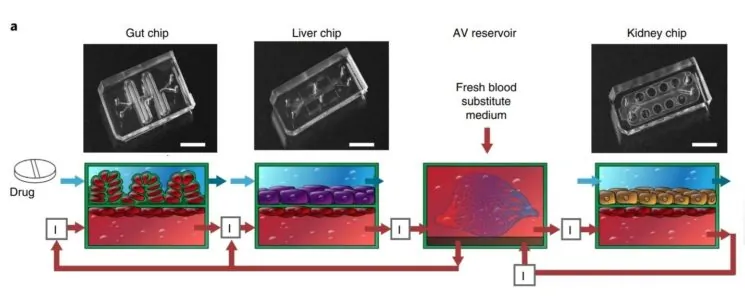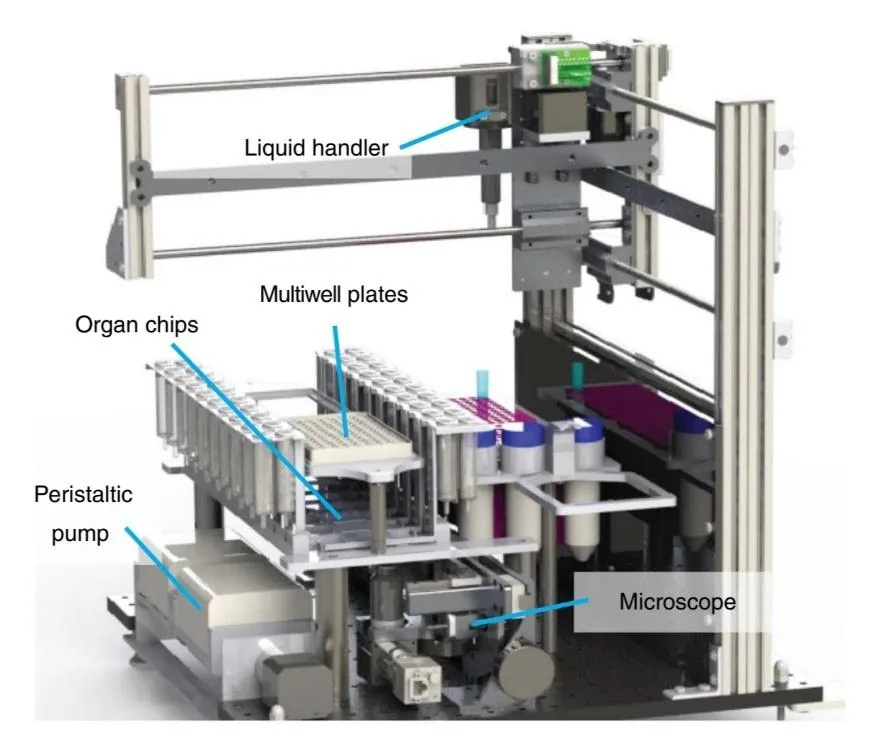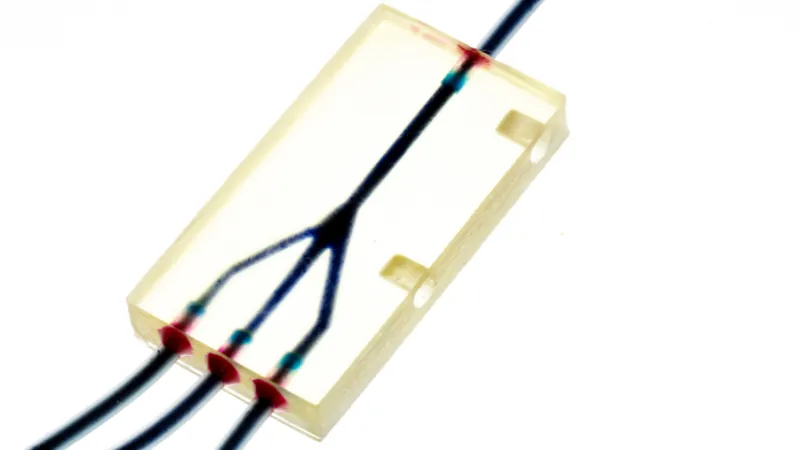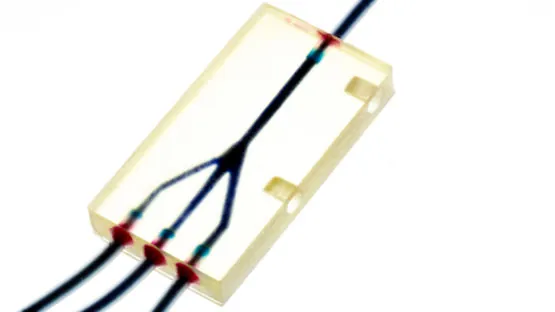Researchers from the Universities of Harvard and Tel Aviv have succeeded in linking up to 10 “organs-on-a-chip” via an analog of human vasculature. The invention allows for in vitro testing of drug toxicity and action, taking us one step closer to automated clinical trials and the development of personalized drugs.
Chipping away at trial duration
While awaiting the emergence of new anti-aging drugs, we expect their road to the shelves to be long, winding, and frustrating, as life-extending medications take years to go through the pharmaceutical pipeline. One promising way to tackle this problem is the development of “organs-on-a-chip” (or “organ chips”). This “chip” has nothing to do with computer microchips; instead, it is a piece of plastic or other material containing a few thousands of parenchymal (organ-specific) cells that imitate the organ’s action. Basically, it’s a working model of an organ. For example, a “liver-on-a-chip” imitates the liver’s filtration routine, a “heart-on-a-chip” undergoes contraction, and an “intestine-on-a-chip” conducts peristaltic action and absorption.
Organ chips can help to solve numerous problems associated with drug development. New drugs that were successfully tested in animals often fail human clinical trials due to fundamental interspecies differences. Organ chips can potentially replace early animal testing, saving vast amounts of money and effort. As the technology matures, it can also complement Phase 1 clinical trials, which test drug toxicity. Parenchymal cells donated by a single human can undergo hundreds of such trials, each of which costs a fraction of the time and money that an actual human trial does.
These chips can also potentially revolutionize personalized medicine (PM), including the creation of personalized drugs. With organ chips, trials can be conducted on live cells taken from a specific patient without risking the patient’s health. Multiple trials can be run simultaneously to quickly find a life-saving solution.
From organ chips to “human-on-a-chip”
These researchers have made a major leap by developing a sophisticated system that they call a “human-on-a-chip” [1]. One of the hallmarks of this new system is that the organ chips are linked together, in a robotic environment, via a “vascular system” that contains a blood substitute made of vitamins, minerals, hormones, and other essential components. The system transports artificial blood to and from the organ chips to mimic drug distribution and dilution. More importantly, unlike previous models, the new chips include a layer of endothelial cells (cells that line the interior surface of blood vessels) laid along the organ-specific cells. The endothelial barrier emulates a blood vessel and is needed to effectively recapitulate the drug’s pharmacokinetics (PK) – the way it travels through the body.

For example, the system allows the modeling of oral administration, as a drug is delivered to the “intestine-on-a-chip” and then travels to other organs. In one of the experiments, the researchers had modeled the administration of nicotine, and the results were consistent with what we know about nicotine’s PK in vivo. To extrapolate the results received from just a few thousand cells, the researchers used custom-made scaling software.
Theoretically, the system can consist of up to 10 organ chips, but the researchers admit that, currently, the best results are achieved with up to three organs linked together. In one of the two companion papers, the researchers describe a model designed to mimic a first-pass drug absorption. The model consists of gut, kidney, and liver organ chips. First-pass is a phenomenon in which drug concentration is drastically reduced before it reaches systemic circulation, due to metabolism inside the liver and other organs. Studying the first-pass effect on a drug is essential to determining the right dosage. The new device can greatly simplify this task while eliminating any risk to the patients.
Behold the interrogator
The researchers have also constructed a robotic system for conducting experiments on their “human-on-a-chip” [2]. The system, called an interrogator, can run preprogrammed experiments and collect data automatically. It also keeps the tissues inside the organ chips alive and well. The system includes a precision manipulator and an integrated mobile microscope. During the trials, the interrogator successfully maintained the viability and organ-specific functions of eight interlinked organ chips (intestine, liver, kidney, heart, lung, skin, blood-brain barrier and brain) for three weeks.

Conclusion
This is not the first time that automation has been used to drastically reduce the time needed for drug development and testing. Last year, the pharmaceutical start-up Insilico Medicine made headlines by creating a new drug from scratch in 46 days using machine learning algorithms.
By linking several organ chips together and making successful predictions of human responses to drugs, these researchers have cleared another major hurdle on the way to automating certain aspects of drug development. It can result in new drugs being developed and tested in a much faster and safer way – a welcome advancement, considering that currently drug trials take several years.
Literature
[1] Herland, A., Maoz, B. M., Das, D., Somayaji, M. R., Prantil-Baun, R., Novak, R., … & Chalkiadaki, A. (2020). Quantitative prediction of human pharmacokinetic responses to drugs via fluidically coupled vascularized organ chips. Nature Biomedical Engineering, 1-16.
[2] Novak, R., Ingram, M., Marquez, S., Das, D., Delahanty, A., Herland, A., … & Calamari, E. (2020). Robotic fluidic coupling and interrogation of multiple vascularized organ chips. Nature Biomedical Engineering, 1-14.




